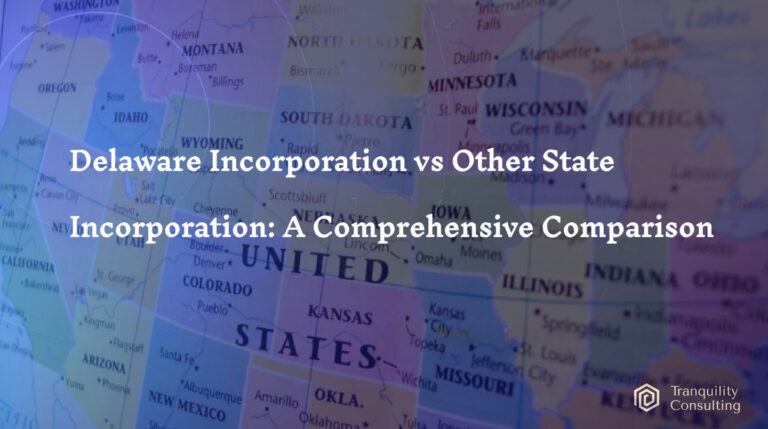Choosing the right state can have significant legal and financial implications when deciding where to incorporate your business. Delaware often emerges as the frontrunner due to its business-friendly environment, but how does it stack up against other states like New York, Texas, and California? Let’s delve into a detailed comparison of Delaware incorporation vs other state incorporation to help you make an informed decision.
Delaware Incorporation: Why Is It So Popular?
Delaware incorporation is renowned for several reasons:
Delaware is renowned for its business-friendly environment due to its well-established corporate laws that offer significant flexibility in corporate governance. The state’s Court of Chancery, a specialized court for business disputes, provides swift and expert resolution of corporate issues, further enhancing its appeal to companies. Additionally, Delaware ensures privacy by not requiring the disclosure of shareholders’ and directors’ names in incorporation documents. While Delaware does impose a franchise tax, it does not tax out-of-state income, making it particularly attractive for businesses with national operations.
Comparison of Delaware Incorporation vs Other State Incorporation
| State | Business Climate | Court Systems | Running Cost |
| Delaware | – Business-friendly legal environment with flexible corporate governance. – Strong privacy protections for shareholders and directors. – No state corporate income tax on out-of-state income. | – Specialized Court of Chancery for business disputes, leading to quicker resolution. – Extensive corporate case law providing clarity and predictability. | – Relatively low incorporation fees but potential significant franchise tax. – No state sales tax, advantageous for retail and e-commerce businesses. |
| New York | – Robust laws but not as business-centric or flexible as Delaware’s. – Various tax credits and incentives for specific industries (e.g., technology, manufacturing). – High corporate tax rates and compliance costs. | – Corporate cases handled in general courts, potentially longer litigation times. – Less extensive corporate case law compared to Delaware. | – Higher incorporation and ongoing compliance costs, including publication of formation documents. – Sales and use tax exemptions available for certain purchases, but higher overall tax rates. |
| Texas | – Business-friendly, no state income tax, lower operational costs. – Supportive of business with various economic development programs. – Competitive franchise tax based on gross revenue. | – General courts handle corporate disputes, but with less specialized knowledge than Delaware. – Less legal certainty due to fewer corporate case precedents. | – Lower overall tax burden with no state income tax, but franchise tax applies. – No state sales tax, which benefits various business models. |
| California | – Stringent regulatory environment, high compliance, and labor laws. – Innovation-focused with significant R&D tax credits and incentives for high-value industries. – High corporate income taxes and additional fees, making it one of the costliest states. | – General courts have longer litigation times and more complex procedures. – The court system is less favorable for businesses than Delaware’s. | – High incorporation fees and ongoing costs due to stringent regulatory requirements. – Sales tax exemptions for certain industries but higher overall tax liabilities. |
State-based tax benefits for business incorporation
Your chosen state can significantly impact your tax liabilities and overall financial strategy when incorporating a business. Different states offer various tax incentives and benefits that can influence your decision. Here’s a breakdown of the tax benefits based on the state of incorporation:
Delaware
- Delaware does not impose a state sales tax, which can be advantageous for businesses involved in retail or e-commerce. The state offers competitive corporate income tax rates, although a franchise tax is based on the company’s shares or assets. Privacy protections are strong, as Delaware does not require the disclosure of shareholders and directors in public records.
- Delaware does not tax income earned outside the state, which is beneficial for businesses operating nationally or internationally. The state’s Court of Chancery specializes in business law and provides a sophisticated legal framework and faster dispute resolution.
New York
- New York offers various tax credits and incentives for businesses in specific industries, including technology and manufacturing. Businesses that create jobs in New York may qualify for job creation tax credits and other financial incentives.
- The state allows businesses to deduct property taxes, which can help reduce overall taxable income. Certain companies may also qualify for sales and use tax exemptions on specific types of purchases. However, New York has relatively high corporate tax rates compared to other states, which can impact business costs.
Texas
- Texas does not impose a state income tax on corporations or individuals, making it an attractive option for many businesses. The state has a franchise tax based on gross revenue, which can be lower than income tax rates in other states, depending on the business size. Texas offers various incentives, including grants for specific industries and business expansion programs.
- There are several economic development programs aimed at supporting businesses through tax abatements and other incentives. The lack of state income tax and competitive franchise tax rates can result in a lower overall tax burden.
California
- California provides tax credits to businesses that want to grow and create jobs in the state, particularly in high-value industries. Businesses engaged in R&D activities can benefit from significant tax credits aimed at encouraging innovation. The state offers sales tax exemptions for certain sectors, such as manufacturing and agriculture.
- California has higher corporate income tax rates than many other states, which can impact businesses’ overall tax liabilities. California also offers tax credits and incentives for companies investing in renewable energy and sustainability projects.
Ease of doing Business in the US
The ease of doing business in the US varies significantly by state, influenced by regulatory environments, tax structures, and available incentives. With its business-friendly laws and specialized court system, Delaware offers a streamlined process for handling corporate matters. While providing substantial tax incentives for specific industries, New York imposes higher compliance costs. Texas is attractive due to its low state-income tax and lower operational costs. Despite its stringent regulations and high taxes, California offers valuable tax credits for innovation and sustainability.
Conclusion:
Delaware’s incorporation stands out for its business-friendly legal environment, privacy protections, and specialized Court of Chancery. However, the best state for incorporation depends on your specific business needs. New York offers significant tax incentives, especially for technology and manufacturing, but has higher compliance costs. Texas is appealing for its lack of state income tax and lower operational costs, making it ideal for business growth. Despite its strict regulations and high taxes, California provides valuable tax credits for innovation and sustainability, benefiting high-value industries. Choosing where to incorporate should be based on carefully assessing each state’s legal, tax, and regulatory benefits, aligned with your business’s long-term goals and operational requirements.
FAQs
- How can Tranquility Consulting assist with business incorporation decisions?
Tranquility Consulting provides expert guidance on selecting the best state for your business incorporation. We analyze your specific business needs, legal requirements, and tax implications to recommend the optimal state for incorporation. Our services include comprehensive legal and financial analysis, helping you navigate complex regulations to ensure your business is set up for success..
- How does Delaware incorporation compare to New York?
Delaware has more flexible corporate laws and lower incorporation fees, while New York offers specific industry tax incentives but higher compliance costs.
- What are the benefits of incorporating in Texas?
Texas has no state income tax, lower operational costs, and various business incentives, though it lacks Delaware’s extensive corporate case law.
- Why might a business choose to incorporate in California?
Despite higher taxes and stringent regulations, California offers substantial tax credits for R&D, innovation, and sustainability projects.
- What are the tax benefits of incorporating in Delaware?
Delaware does not impose a state sales tax or tax income earned outside the state, making it favourable for businesses with national or international operations.
If you have any questions or need business-related tax consulting advice, please contact us at: [email protected]





